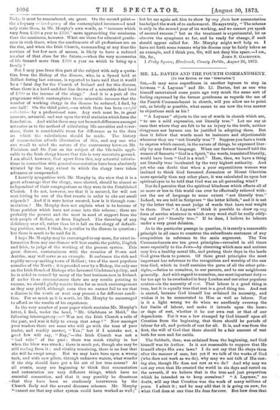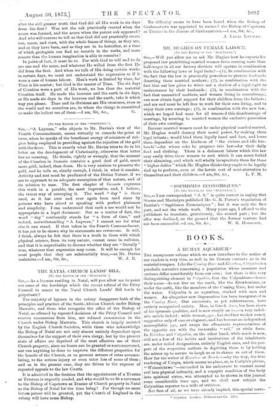MR. LL. DAVIES AND THE FOURTH COMMANDMENT.
[TO THII EDITOR OF TRH " EPROTATOR.1
Sin,—It may seem superfluous in another layman to step in between "A Layman" and Mr. Ll. Davies, but as one who himself entertained some years ago very much the same sort of feeling expressed by the former gentleman as regards the use of the Fourth Commandment in church, will you allow me to point out, as briefly as possible, what seems to me now the true answer to objections such as his ?
"A Layman" objects to the use of words in church which are, "to use a mild expression, not literally true." Let me say at once that where they are felt to be an injury to the truth, neither clergymen nor laymen can be justified in adopting them. But does it follow that words must be insincere and objectionable wherever they are "not literally true"? Suppose you have a truth. to express which cannot, in the nature of things, be expressed liter- ally by any form of language. When our Saviour himself told the woman of Samaria "God is a Spirit," the words, translated literally, would have been "God is a wind." Here, then, we have a things not literally true inculcated by the very highest authority. And yet who can doubt that when a poor superstitious woman was inclined to think God favoured Jerusalem or Mount Gheriziin more specially than any other place, it was calculated to open her spiritual eyes to be told that God was an all-pervading wind ?
Nor do I perceive that the spiritual blindness which affects all of us more or less in this world can ever be effectually relieved with- out the use of language to some extent "not literally true."' Indeed, we are told in Scripture " the letter killeth," and it is not by the letter that we must judge of words that have real weight in them. Does "A Layman" think it possible to draw up any form of service whatever in which every word shall be really edify- ing and yet "literally true." If he does, I believe he labours under a very great delusion.
As to the particular passage in question, it is surely a reasonable. principle in all cases to construe the subordinate sentences of any composition in reference to the main argument. The Ten Commandments are ten great principles—revealed in old times. more especially to the Jews—by observing which men and nations- may live a healthy moral life, and prolong their days in the lands. Godgives them to possess. Of these great principles the most. important has reference to the recognition and worship of the one true God, which in itself contains the germ of all the other prin- ciples,—duties to ourselves, to our parents, and to our neighbours generally. And with regard to ourselves, one most inportant duty— far too apt to be overlooked in busy London and our other populous centres—is the necessity of rest. That labour is a good thing is. true, but it is equally true that rest is a good thing too. And rest is sacred, because God himself has ordained its necessity, an& wishes it to be consecrated to Him as well as labour. Nor is it a light wrong we do when we needlessly overstep the fair limits of labour, and make it intrude upon the hours. or days of rest, whether it be our own rest or that of our dependents. For it was a law stamped by God himself upon all Creation from the beginning, that there should be periods of labour for all, and periods of rest for all. It is, and was from the first, the will of God that there should be a fair amount of rest both for men and for cattle.
The Sabbath, then, was ordained from the beginning, and God himself was its Author. Is it not reasonable to suppose that He- himself obeys His own laws? I do not say that He obeys them after the manner of men, but yet if we talk of the works of God (who does not work as we do), why may we not talk of His rest- ing also, though He does not rest as we do? And why may we not say even that He created the world in six days and rested on the seventh, if we believe that is the true and just proportion which he intended us to keep ourselves "A Layman," no doubt, will say that Creation was the work of many millions of years. I admit it ; and he may add that it is going on now, for what God does at one time He does for ever. But how does that alter the still greater truth that God did all His work in six days from the first ? Was not the oak practically created when the acorn was formed, and the acorn when the parent oak appeared ? And who will venture to tell us that God did not practically create sun, moon, and stars, with the whole frame of things, as they are, and as they have been, and as they are to be hereafter, at a time of which geologists can find no records in the rocks, and more remote than the human imagination is able to conceive?
In point of fact, it must be so. For with God to will and to do are one and the same, and whatever He willed from the first He did from the first. And when we talk of His doing certain works in certain days, we must not understand the expression as if it were a case of human labour. Man's work is limited by time, for Time is his master ; but God is the master of Time. The six days of Creation were a part of His work, no less than the material Creation itself. He made the heavens and the earth in six days, or He made six days in the heavens and the earth, take it which way you please. Time and its divisions are His creatures, even as the world and we ourselves are, to whom the charge is committed to make the holiest use of them.—I am, Sir, &c., G.































 Previous page
Previous page